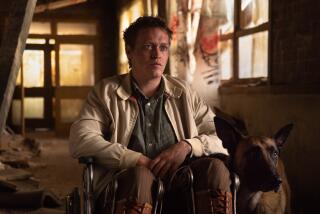‘The Wolf of Wall Street’ bares teeth, if not soul, critics say
So far “The Wolf of Wall Street,” Martin Scorsese’s three-hour look at hedonistic white-collar crook Jordan Belfort, hasn’t necessarily been warmly welcomed by mainstream audiences. Fortunately for Scorsese and leading man Leonardo DiCaprio, movie critics have been more favorable toward “The Wolf,” with many praising its biting wit and live-wire energy, even while questioning its depth.
In a glowing review for The Times, Betsy Sharkey writes, “Man, does this movie have a savage bite. Yet it is such a kick to watch [Scorsese] and [DiCaprio] in their fifth collaboration. They go at the black-hearted comedy full throttle, fully tanked and, for DiCaprio, full monty — almost.” DiCaprio is “fierce and in your face,” and the rest of the casting is “spot-on across the board,” with supporting turns from Jonah Hill (“a standout”), Jean Dujardin, Rob Reiner and Kyle Chandler. The film, Sharkey says, “fairly crackles with electricity from beginning to end. A very fast three hours, ‘Wolf’ is a fascinating, revolting, outlandish, uproarious, exhilarating and exhausting master work on immorality.”
Mick La Salle of the San Francisco Chronicle similarly raves, “Though ‘Raging Bull’ must still go down as Martin Scorsese’s greatest achievement, ‘The Wolf of Wall Street’ makes the race for No. 2 a lot more interesting.” He continues: “It runs a full three hours but feels that long only in terms of its abundance. There’s just so much here — so many characters, so many famous faces, so many turns of story, so many indelible set pieces — that thinking about it afterward is like contemplating some deranged tapestry.”
PHOTOS: Behind the scenes of movies and TV
For Joe Morgenstern of the Wall Street Journal, however, “The Wolf” only skims the surface. He writes, “It’s meant to be an entertaining, even meaningful representation of the penny-stock maestro’s life and times. But I couldn’t buy it, and couldn’t wait for the hollow spectacle to end. That’s no knock on Mr. DiCaprio, who throws himself, heart and soul, into a character with deep deficits in both departments.” Morgenstern says that he’ll “stipulate that his extravagant embodiment of excess is extremely skillful and very funny.” But eventually, “the pandemonium wears you down,” he wrote, adding that in his case that happened at “the end of the first hour, with two more hours to go.”
In a similar vein, Ann Hornaday of the Washington Post calls the film a “big, bravura, maddeningly uneven indictment of the extreme financial depredations that characterized the 1990s.” While Scorsese is “still working at the top of his game,” Hornaday writes, “the film’s nominal subjects — Belfort’s ignominious rise (did he ever really fall?) and the gluttonous underbelly of capitalism he represents — aren’t particularly interesting, or new.” In the end, she says, “‘The Wolf of Wall Street’ remains one-note even at its most outre, an episodic portrait of rapaciousness in which decadence escalates into debauchery escalates into depravity.”
And the New York Times’ A.O. Scott says the film “hums with vulgar, voyeuristic energy. It has been a while since Mr. Scorsese has thrown himself into filmmaking with this kind of exuberance. … This movie may tire you out with its hammering, swaggering excess, but it is never less than wide-awake.” For Scott, there’s one big question at hand: “Is this movie satire or propaganda?” Put another way, “Does ‘The Wolf of Wall Street’ condemn or celebrate? Is it meant to provoke disgust or envy? These may be, in the present phase of American civilization, distinctions without a meaningful difference behind them.”
ALSO:
What’s the most overrated movie of 2013? [Poll]
Julia Roberts: From America’s Sweetheart to neighborhood mom
More to Read
Only good movies
Get the Indie Focus newsletter, Mark Olsen's weekly guide to the world of cinema.
You may occasionally receive promotional content from the Los Angeles Times.






